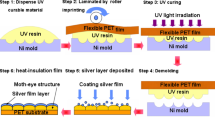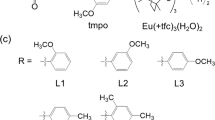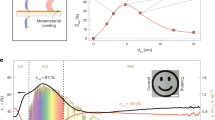Abstract
IN this note the suitability of the new optical plastics for use in the Fresnel rhomb is discussed. Because the polarizing angle for a dielectric-to-air surface varies very little with change of frequency, and its polarizing properties are affected less by surface deterioration and the presence of films than is the case with metallic surfaces, polarization by internal reflexion remains the most satisfactory means of producing circularly polarized white light. The problem exists as to what is the most suitable non-metallic medium for this purpose. It is hoped that the following considerations will show that choice is not restricted to the classical glasses adopted since Fresnel's time.
This is a preview of subscription content, access via your institution
Access options
Subscribe to this journal
Receive 51 print issues and online access
$199.00 per year
only $3.90 per issue
Buy this article
- Purchase on Springer Link
- Instant access to full article PDF
Prices may be subject to local taxes which are calculated during checkout
Similar content being viewed by others
References
Wood, R. W., “Physical Optics”, 417 (1934).
Author information
Authors and Affiliations
Rights and permissions
About this article
Cite this article
HARLE, G. Use of Plastics in the Fresnel Rhomb. Nature 166, 149–150 (1950). https://doi.org/10.1038/166149b0
Issue Date:
DOI: https://doi.org/10.1038/166149b0
Comments
By submitting a comment you agree to abide by our Terms and Community Guidelines. If you find something abusive or that does not comply with our terms or guidelines please flag it as inappropriate.



